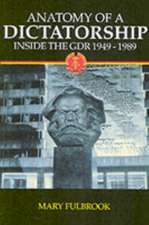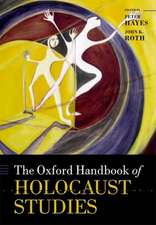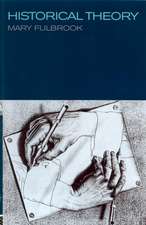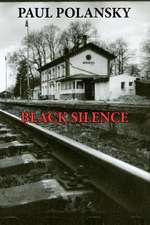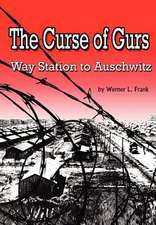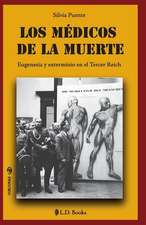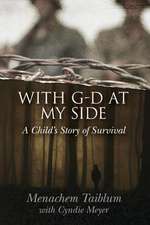Bystander Society: Conformity and Complicity in Nazi Germany and the Holocaust
Autor Mary Fulbrooken Limba Engleză Hardback – noi 2023
Preț: 152.31 lei
Preț vechi: 188.13 lei
-19% Nou
Puncte Express: 228
Preț estimativ în valută:
29.15€ • 31.65$ • 24.48£
29.15€ • 31.65$ • 24.48£
Carte disponibilă
Livrare economică 21-27 martie
Livrare express 15-21 martie pentru 90.65 lei
Preluare comenzi: 021 569.72.76
Specificații
ISBN-13: 9780197691717
ISBN-10: 0197691714
Pagini: 488
Ilustrații: Approx. 30 B/W images
Dimensiuni: 165 x 236 x 38 mm
Greutate: 1.02 kg
Editura: Oxford University Press
Colecția OUP USA
Locul publicării:New York, United States
ISBN-10: 0197691714
Pagini: 488
Ilustrații: Approx. 30 B/W images
Dimensiuni: 165 x 236 x 38 mm
Greutate: 1.02 kg
Editura: Oxford University Press
Colecția OUP USA
Locul publicării:New York, United States
Recenzii
A commendable attempt to understand why people stood by and did nothing when confronted with Nazi barbarism, written by one of the greatest historians of modern Germany.
[a] terrific work of historical scholarship
[A] brilliant new book... Fulbrook brings a lifetime of scholarship and reflection, as well as a fearless courage, to the task.
Mary Fulbrook superbly weaves contemporary accounts of experiences from Jews and non-Jews into a rich tapestry that shows how Germany under Hitler gradually turned into a society capable of the Holocaust.
With her signature insightfulness, historian Mary Fulbrook addresses the fascinating but troubling problem of 'bystanders' to the Holocaust. She probes how social dynamics in Hitler's early years pushed non-Jews to conform, and how after the Nuremberg Laws of 1935 most fervently did so. By the late 1930s, more Germans became complicit in Nazi crimes and, during World War II, German, Austrian, and Baltic 'bystanders' eagerly engaged in violence, participating in genocide. This gripping account is a must-read for anyone interested in how bystanders became accomplices and later perpetrators, and how democracy could be destroyed.
It is a great achievement of Mary Fulbrook that she succeeds in making this great failure clear and plausible through a micro-analysis of scenes from the period of German society from 1933 to 1945.
Fulbrook's latest study attempts to explain how Germany became a society able to perpetrate the Holocaust by rejecting, or at least challenging scholars to rethink, the idea of bystander...Fulbrook argues that by the beginning of the war in Europe, many Germans were primed to be accomplices in atrocities in Eastern Europe, thereby becoming complicit in the 20th-century's largest genocide. Recommended.
[a] terrific work of historical scholarship
[A] brilliant new book... Fulbrook brings a lifetime of scholarship and reflection, as well as a fearless courage, to the task.
Mary Fulbrook superbly weaves contemporary accounts of experiences from Jews and non-Jews into a rich tapestry that shows how Germany under Hitler gradually turned into a society capable of the Holocaust.
With her signature insightfulness, historian Mary Fulbrook addresses the fascinating but troubling problem of 'bystanders' to the Holocaust. She probes how social dynamics in Hitler's early years pushed non-Jews to conform, and how after the Nuremberg Laws of 1935 most fervently did so. By the late 1930s, more Germans became complicit in Nazi crimes and, during World War II, German, Austrian, and Baltic 'bystanders' eagerly engaged in violence, participating in genocide. This gripping account is a must-read for anyone interested in how bystanders became accomplices and later perpetrators, and how democracy could be destroyed.
It is a great achievement of Mary Fulbrook that she succeeds in making this great failure clear and plausible through a micro-analysis of scenes from the period of German society from 1933 to 1945.
Fulbrook's latest study attempts to explain how Germany became a society able to perpetrate the Holocaust by rejecting, or at least challenging scholars to rethink, the idea of bystander...Fulbrook argues that by the beginning of the war in Europe, many Germans were primed to be accomplices in atrocities in Eastern Europe, thereby becoming complicit in the 20th-century's largest genocide. Recommended.
Notă biografică
Mary Fulbrook is Professor of German History at University College London. Among other books, she is the author of A Small Town near Auschwitz: Ordinary Nazis and the Holocaust, winner of the Fraenkel Prize, and, most recently, Reckonings: Legacies of Nazi Persecution and the Quest for Justice, awarded the Wolfson History Prize.


